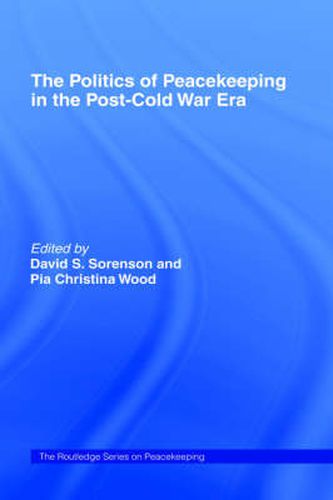Readings Newsletter
Become a Readings Member to make your shopping experience even easier.
Sign in or sign up for free!
You’re not far away from qualifying for FREE standard shipping within Australia
You’ve qualified for FREE standard shipping within Australia
The cart is loading…






Much of the scholarly literature on peacekeeping focuses on particular peacekeeping operations, or on the political bargaining between peacekeeping participants at both the institutional and national levels. However, there is very little published research on why nations commit forces to peacekeeping operations. As Sandra Whitworth noted in a book review of six books on peacekeeping in the International Journal, the important political questions thus far have not been asked: who benefits, who pays, and who is excluded? . This book addresses that need. The authors focus specifically on the political and economic motivations that influence the decision to participate in peacekeeping. They consider how definitions of national interest frame the political debate, and what the reasons are for the military support or opposition for peacekeeping operations. They also explore the role of inter-agency politics, the role of public opinion in peacekeeping decisions, and the influence of pressure from other nations and non-nation actors to commit peacekeeping forces. Each chapter includes several recent cases of national peacekeeping to illustrate how national political debates framed their country’s political decisions on the commitment of peacekeeping forces. The countries chosen for analysis are Australia, Argentina, the United Kingdom, Germany, France, the United States, Nigeria, Canada, India, and Austria. Alan James Bullion, The Open University, UK Mary Hampton, University of Utah, USA Herbert M. Howe, Edmund A. Walsh School of Foreign Service, Georgetown University, USA
$9.00 standard shipping within Australia
FREE standard shipping within Australia for orders over $100.00
Express & International shipping calculated at checkout
Much of the scholarly literature on peacekeeping focuses on particular peacekeeping operations, or on the political bargaining between peacekeeping participants at both the institutional and national levels. However, there is very little published research on why nations commit forces to peacekeeping operations. As Sandra Whitworth noted in a book review of six books on peacekeeping in the International Journal, the important political questions thus far have not been asked: who benefits, who pays, and who is excluded? . This book addresses that need. The authors focus specifically on the political and economic motivations that influence the decision to participate in peacekeeping. They consider how definitions of national interest frame the political debate, and what the reasons are for the military support or opposition for peacekeeping operations. They also explore the role of inter-agency politics, the role of public opinion in peacekeeping decisions, and the influence of pressure from other nations and non-nation actors to commit peacekeeping forces. Each chapter includes several recent cases of national peacekeeping to illustrate how national political debates framed their country’s political decisions on the commitment of peacekeeping forces. The countries chosen for analysis are Australia, Argentina, the United Kingdom, Germany, France, the United States, Nigeria, Canada, India, and Austria. Alan James Bullion, The Open University, UK Mary Hampton, University of Utah, USA Herbert M. Howe, Edmund A. Walsh School of Foreign Service, Georgetown University, USA